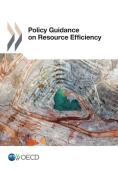
This report responds to the request by G7 Leaders at the Schloss Elmau Summit in June 2015, for the OECD to develop policy guidance on resource efficiency. Establishing a resource efficient economy is a major environmental, development and macroeconomic challenge today. Improving resource efficiency by putting in place policies that implement the principles of reduce, reuse, recycle (the 3Rs) is crucial to improving resource use, security and competitiveness while diminishing the associated environmental impacts.
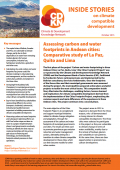
The capital cities of Bolivia, Ecuador and Peru are vulnerable to climate change, partly due to their dependence on water from retreating Andean glaciers for human consumption, industrial use, hydropower production, agriculture and other uses. This comparative study of La Paz, Quito and Lima highlights the challenges, enabling factors, lessons learned and implications for climate compatible development illustrated by a project to assess the cities’ carbon and water footprints.
Key findings include:
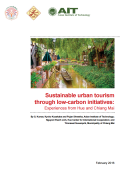
Tourism contributes to about 5% of total global greenhouse gas emissions, and the most common greenhouse gas, carbon dioxide (CO2), is emitted through goods and services related to tourism. Major tourism-related CO2 contributors include energy used for transport (from origin to destination as well as for local travel at the destination), development and operation of tourism infrastructure (e.g. hotels, road construction, heating and cooling) and various leisure activities. Thus, tourism contributes to some extent to global warming and climate change.
This report constitutes the background paper prepared for a CDKN-ICLEI learning programme. It provides a deeper analysis of the different factors which determined the course and the final outcome of the project ‘Sustainable urban tourism through low-carbon initiatives: Experiences from Hue and Chiang Mai’, conducted during 2012–2013.
The report’s main objective is to provide key lessons from the sustainable urban tourism project through the analysis of different enabling conditions and obstacles that determined the course and the final outcome of the initiative.
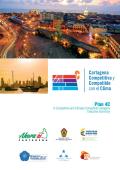
This report outlines the strategies in place for the World Heritage City of Cartagena, Colombia to become an icon of climate compatible development, where the risk of climate change is converted into an opportunity for development.
The future of Cartagena is uncertain and vulnerable to climate change. Even a 2C increase in temperatures will likely raise sea levels in the area by 60cm by 2040. Further risks of drought, and increased rainfall have motivated action to prevent such events unfolding and hampering the future of its citizens.
The vision of Plan 4C is that by 2040, Cartagena de Indias will be recognised as a city that is a model of urban and coastal planning based on climate compatible development: where adaptation and mitigation measures will reduce indices of vulnerability to climate change, improve efficiency of public investment, the quality of life of its inhabitants and the competitiveness of its sectors.
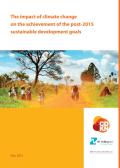
A high-ambition agreement that provides a clear policy framework for action on climate change, incentivises international cooperation, and mobilises additional resources for mitigation and adaptation activities is essential to give us the best chance of achieving the SDGs by 2030. Likewise, strong SDGs will help to lay the policy groundwork for achieving and implementing a more ambitious climate agreement.
This report, The impact of climate change on the achievement of the post-2015 sustainable development goals, considers impacts on development over the next 15 years, under two scenarios for the 2015 climate change agreement: a high-ambition agreement and a low-ambition agreement. It looks at associated policies and levels of investment in mitigation and adaptation. The high-ambition scenario used is based on the UNFCCC aim to limit global warming to a 2°C increase on pre-industrial temperatures.
